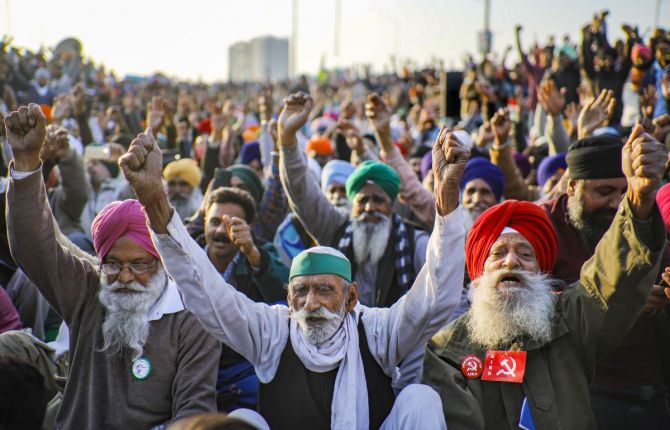'However, this time it looks like that is not working.'

With farmers camping at the national capital's borders protesting against the Centre's three farm Acts, Punjab Finance Minister Manpreet Singh Badal tells Dilasha Seth and Indivjal Dhasmana that while the state welcomes corporate houses to invest, it can't create a system where farmers could be exploited.
The Centre has assured the continuation of MSP. What is the problem in accepting these laws now?
The verbal assurance has only come after a massive agitation.
Even this is suspicious as most of the institutions including the Reserve Bank of India and the Commission for Agricultural Costs and Prices have time and again reiterated that the MSP system should go.
There is a difference between what the Centre is saying and what its various organs are doing.
The fear is that unlimited procurement of crops will cease.
What solution do you have in mind to break the impasse between farmers and the Centre?
If there is so much opposition from farmers, the intended beneficiaries of these Acts, the only feasible solution is to repeal them.
So many changes have been proposed that the original purpose has been lost.
We need a new Act that looks at the issues afresh.
Punjab made Acts inoperative in the state. Why are farmers up in arms against these legislations then?
Punjab is still awaiting assent from the governor and the President for the laws to become operational.
The agitation is against the laws enacted by the Centre, it is against the attempt to dismantle a time tested system.
The farmers are of view that they have been denied their basic democratic right of consultation before the enactment of laws.
Will Punjab's move to nullify the central Acts stand the test of law?
The matter is sub judice, but I would like to point out that being an elected government, we are well within our rights to protect the interest of our farmers and certain provisions in the new Acts fall within the purview of the state, according to the Constitution of India.
Why are farmers' protests restricted to Punjab, Haryana, parts of Uttar Pradesh and Rajasthan?
The media has painted this picture that protests are restricted to these states.
It is just that farmers/farmers' organisations from these states have taken the lead.
The farmers of from these states have benefitted from the functioning of mandis and realise what they will lose if their fears come true.
Rather than replicate the success of the Punjab system elsewhere, it is being proposed to throw farmers under the wheels of corporate houses.
We welcome corporate houses to invest, but we cannot create a system where farmers could be exploited and inequalities will increase.
Prime minister Narendra Modi has said the Acts provide more options to farmers to sell their produce. Is Punjab against these choices being given?
This is a great lie.
Sir Chhotu Ram made the Mandi Act in 1938 whereby farmers had the freedom to sell produce anywhere in the country, but traders had to procure the produce from mandi premises and were regulated by the state.
These Acts give traders the freedom to procure from the farmer's field.
Leave aside new options, the Centre is actually taking away a time-tested option.
It will throw the nation back into food insecurity once again.
The new Acts free traders from the ambit of regulation and accountability.
Will taxing out-of-mandi transactions satisfy farmers? But, mandi tax itself is quite high in Punjab. Will you reduce it?
Farmers do not pay mandi charges.
They are paid by the buyer.
The mandi charges a certain commission to build and maintain the marketing and rural infrastructure.
Punjab has one of the best marketing infrastructures in the country and it has to be maintained.
The Centre has broadly agreed on a dispute resolution mechanism. Do you suggest any further changes?
Please look at their approach, they did not even talk to farmers when they were protesting on the railway tracks.
Even now it is not clear who is leading the talks from the Centre's side.
Earlier it was the agriculture minister, now the role has been taken over by the home minister.
The approach is to dilly-dally so that the protests fizzle out.
However, this time it looks like that is not working.
Feature Presentation: Aslam Hunani/Rediff.com











